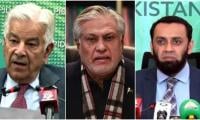Is the wave of neo-populism declining across the globe? The answer to this question is still ambiguous. However, from the tempestuous exit of Imran Khan and the defeat of Jair Bolsonaro in the presidential race to the inglorious exit of Boris Johnson and the indictment of Donald Trump, there is some progression in this trend.
One thing common in all these leaders is that they do not accept their political defeat gracefully. Instead, they brazenly shun the audacity to confront their ignoble acts directly, opting for flimsy pretexts in a desperate endeavour to mask their transgressions and misdeeds.
The international stage bears witness to a spectacle where these leaders pivot from one unscrupulous manoeuvre to another, their deceitful facades gradually slipping away, revealing their true colours. Defying conventional wisdom, they audaciously flout every rule in the political playbook.
Take, for instance, Donald Trump, who remains the favoured contender for the Republican Party’s nomination in the impending presidential race, despite an extensive record of transgressions. Accusations of sexual assault, around 37 criminal charges associated with classified records, and even the instigation of an assault on the very heart of American democracy – the Capitol Hill – have failed to impede Trump’s path. His momentum persists, fuelled by the dissemination of baseless claims surrounding the 2020 presidential election.
“On November 5, 2024, justice will be done. We will take back our country,” bragged former US president Trump in front of his supporters just few hours after pleading not guilty in a South Florida courthouse to federal charges of allegedly mishandling classified information. Trump is trying to use his indictment – the first-ever in America’s presidential history – to his advantage. His post-indictment belligerent moves are part of a strategic plan to turn his legal woes into political gain.
Trump, a typically divisive populist figure, now seeks to leverage his legal predicament for his political advantage. Like a shrewd tactician, Trump has embarked upon a series of defiant manoeuvers following his indictment, weaving together a strategic plan aimed at transforming his legal woes into a springboard for his resurgence.
With a keen eye for political theatrics, Trump has employed a belligerent approach, defying conventional politicking and exploiting every opportunity to gain attention. Every step he takes is carefully choreographed to maintain a grip on his supporters’ pulse, ensuring that his name remains in the headlines. Trump is employing a calculated narrative, one that portrays the indictment as a direct assault on his presidency and a subversion of the democratic will of the people.
Through this lens, he stokes the embers of resentment among his loyal followers, cultivating a potent brew of perceived persecution and systemic injustice. “Joe Biden will forever be remembered as not only the most corrupt president in the history of our country, but perhaps, even more importantly, the president who, together with a band of his closest thugs, misfits, and Marxists, tried to destroy American democracy,” Trump said in his typical bullying style to counter-attack President Biden and his associates.
But beneath the theatrics lies a shrewd strategic calculus. Trump recognizes the power of victimhood, and he is harnessing its emotional resonance to solidify his base and expand his political capital. By presenting himself as the embattled underdog, he taps into a deeply ingrained sense of grievance, a belief that the establishment conspires against those who dare challenge its dominance.
Through the indictment controversy, Trump is trying to distract the public, polarize the electorate, and galvanize his fervent supporters. In the realm of politics, adversity can be an unexpected ally, and Trump, ever the astute showman, is striving to turn the tables on his accusers. While the legal battle lingers on in the courtroom, he has waged a parallel war on the political stage, betting that the court of public opinion holds the key to his ultimate redemption.
Through calculated moves and a flair for controversy, he endeavours to transform his indictment into a potent weapon, channelling it to reshape the Republican discourse and secure his political resurrection. In a characteristically elusive manner, Trump sidestepped addressing the specific charges levelled against him, instead mounting a defence of his decision to keeping sensitive national security documents. Justifying his actions, he boldly asserted, “I had every right to have these documents. These boxes were containing all sorts of personal belongings. Whatever documents the president takes with him, he has a right to do so. It is an absolute right. This is the law.”
Drawing upon a questionable precedent, Trump has invoked what he calls the ‘Clinton socks case’ in an attempt to establish a parallel that would justify his own actions. In this case, which unfolded in 2010, a conservative group known as Judicial Watch sued former president Bill Clinton, alleging mishandling of classified material. The group sought to have the National Archives take custody of audio recordings Clinton had kept in a sock drawer, claiming they were presidential records. However, a district judge ruled that these recordings were personal rather than presidential records, undermining the case’s relevance to Trump’s situation.
There is a big difference between the two cases: while Clinton cooperated with the government’s efforts to retrieve the tape-recordings, Trump obstructed attempts to reclaim the hundreds of documents he took from the White House to Mar-a-Lago. Thus, Trump’s attempt to find solace in the ‘Clinton socks case’ fails to withstand scrutiny and raising further questions about his handling of sensitive materials. Considering his track-record of misleading statements about Hillary Clinton’s emails, Joe Biden’s papers, and Bill Clinton’s audio diaries, his detractors allege that he is resorting to such tactics to divert attention from his wrongdoings. Trump has dismissed the charges against him as “fake and fabricated”, attributing them to a purportedly left-leaning activist-prosecutor.
Trump’s current ethical frailty is unparalleled in the annals of American political leadership, as he grapples with the legal problems. Like a typical populist politician, he flits from one excuse to another. At first, he insinuated that the FBI had staged the search at Mar-a-Lago in August, claiming they manipulated evidence and illegally leaked photos to the press. Then he asserted his entitlement to unrestricted control over his papers, as if official government documents were mere trifles he could hoard at will.
Yet suddenly, these papers transformed into a hodgepodge of souvenirs, ranging from shoes and T-shirts to personal snapshots. The cycle of shifting narratives continues unabated, each turn more bewildering than the last. This convoluted dance of evasion and contradiction exposes the fragility of Trump’s defence. His attempts to deflect accountability reveal a lack of coherence, undermining his credibility in the face of mounting scrutiny.
Despite the absence of political consequences thus far for Trump regarding the alleged mishandling of confidential presidential documents, the risks inherent in nominating a figure who might find themselves diverted from the campaign trail to attend a federal trial as a defendant cannot be discounted indefinitely. It remains to be seen how Republican primary voters will respond to this situation.
Trump also faces the prospect of another trial next year in a separate state case initiated by Manhattan DA Alvin Bragg, accusing him of falsifying business records to conceal hush money payments to a former adult film actress. These charges, filed in April, marked the unprecedented moment of a former president facing criminal indictment. Trump has pleaded not guilty yet the spectre of these legal battles looms.
Trump’s poll numbers continue to show a slight upward trend, defying expectations and highlighting the enduring loyalty of his support base. As the tides of public opinion ebb and flow, the resilience of Trump’s support will be tested, and the true measure of his political future will come into sharper focus.
As the episode unravels, one is left wondering what desperate twist awaits in the ongoing saga. Interestingly, until now, despite such tribulations, Trump is very confident about his return to the Oval Office in 2024, while all his challengers within the Republican Party are far behind in the race.
The writer is a freelance contributor.
Data, today, defines how we make decisions with tools allowing us to analyse experience more precisely
But if history has shown us anything, it is that rivals can eventually unite when stakes are high enough
Imagine a classroom where students are encouraged to question, and think deeply
Pakistan’s wheat farmers face unusually large pitfalls highlighting root cause of downward slide in agriculture
In agriculture, Pakistan moved up from 48th rank in year 2000 to an impressive ranking of 15th by year 2023
Born in Allahabad in 1943, Saeeda Gazdar migrated to Pakistan after Partition







